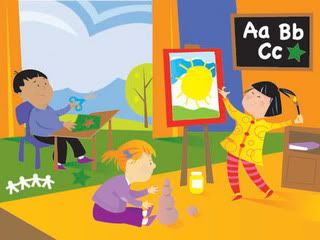"My sister got stung by a bee."
"My name starts with M."
"That tree fell over 'cause of grabity." (purposely misspelled)
"I can count to infinity."
"My mommy is having surgery on her belly so she can wear pretty swimsuits again."
... and so on.
This style of communication is important for teachers and parents to recognize when working with young children for the simple reason that many adults are used to (and new educators are trained to recognize) inquiry as indicators of a child's interests and prior knowledge/schema. Though young children do go through the inevitable "why" stage, in the real world of education it's not often that observers will find twenty kindergarten sets of raised hands asking questions during instructional, story, or play times. In fact, most raised hands will occur so that students can have permission to speak to the teacher to report/tattle/assert some piece of information deemed relevant and important.
Many kindergarten teachers model how to ask a question, requiring students to use who/what/where/when/why/how, and reminding them "that's a story or a statement, you're not asking a question" during Show and Share or as a wrap up to a classroom visitor's special presentation. "Are you asking me, or telling me" is another rethinking/restatement question I pose to students when they have difficulty communicating the difference between their desire for clarification and their need to just tell. But requiring students to pose questions appropriately is not the be-all-end-all goal of verbal interactions in the classroom, and teachers should remember that students' statements open the door for instructional dialogue and curricular, social, and even emotional explorations.

"Those leaves aren't green anymore, they're ugly brown," doesn't sound to many people like a question (and it might not be, you'll have to figure out the communication style of each of your students to know for certain), but to a teacher, it's the perfect segue into a lesson about chlorophyll and seasonal change. When a student makes a statement containing incorrect conclusions, such as "I cut my apple into three halves," it's important that teachers not just deem the statement as wrong, but to realize that the student is attempting to use his or her prior schema and would benefit from gentle guidance and clarification on what "half" means. Too often, inexperienced teachers (or teachers whose best days of instruction are far behind them) react to young childrens' statements and assertions with exasperation and irritability, or demand to know why children won't just ask them for help or clarification when they need it. These teachers are unaware that their expectations are modeled on the social skills and communication behaviors much more appropriately met by older students.

Many of my students, past and present, English and English-as-a-second-language speakers, started kindergarten inconsistently using inflection and tone when it came to asking questions. "The glue bottle is empty" can often be translated to "the glue bottle is empty?" or "Is the glue bottle empty?" while "The swing is wet" accompanied by a silent look from the student translates into the inquiry "how can I use it?"
Communication, language usage, modeling, and practice take up much of a developmentally appropriate kindergarten curriculum. Our students do not just sit silently, soaking up information, translating it while working it over quietly in their own minds sitting still in their chairs. It is this practice, this language experience that occurs in our classrooms that cannot be rushed, ignored, nor devalued by outsiders looking in who just see kids "playing" and "making noise."


No comments:
Post a Comment
As always, thank you for your comments, tips, suggestions and questions!